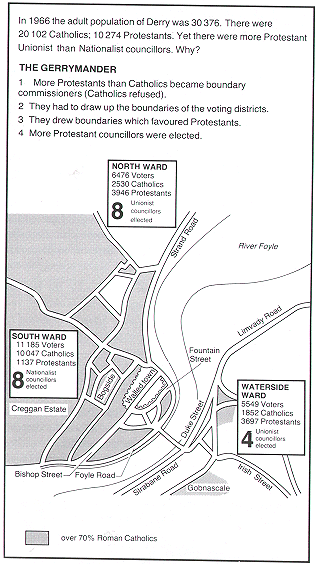
Fears that Catholics would support a national rebellion hardened the attitudes of Protestants
and the Government.
The police - the Royal Ulster Constabulary - recruited many more Protestants than Catholics.
Catholics were supposed to form a third of the force, but in 1922 less than a sixth was Catholic.
This was because most Catholics saw the RUC as a tool of the Unionist Government. Extra men were
recruited into the RUC from the 'Specials'. These were volunteer part-time policemen from the
Special Ulster Constabulary. They did not have to meet the normal entrance requirements for
the police force, and they were allowed to carry arms. Most of the 'specials' were Protestants,
and many were ex-members of the Ulster Volunteer Force (UVF). They were badly disciplined and often
beat up Catholic rioters. Most Catholics feared and hated the 'B-Specials', as they were called.
A Special Powers Act (see below) passed in April 1922 gave the RUC more power than any other
police force in the United Kingdom.
To Catholics this law seemed to be used more against them than against Protestants. They called
it an 'Orange' law. Even when they were given a trial, Catholics had reason to believe that
judges would be biased: By 1970, out of seven judges of the High Court, three were former Unionist
MPs at Stormont (The NI Parliament); a fourth was the son of a Unionist Minister.
The local elections of 1920 brought a threat to the Protestants when Catholics won some control over
local government. Nationalists gained control of 25 out of 80 councils. These included
County Councils like Fermanagh and the City Council of Londonderry. How was this possible when
the majotity of the population in Northern Ireland was Protestant and voted Unionists? The answer was
Proportional Representation (PR). Under this system the number of politicians elected depended upon the
number of votes cast for each party, instead of the number of votes for each candidate. The purpose
of PR was to give the Catholic minority some say in the local government of Northern Ireland. This did not suit
the Unionists. In 1922 the Unionist Government abolished PR.
A special Commission was set up to draw the boundaries for voting disricts in local elections.
Catholics refused to take part in the Commission because they preferred PR. To make sure that Unionists
did better than Nationalists in local elections the Gerrymander was used.
 In the local elections of 1924, Nationalists won control of only two out of 80 councills. The Unionists
had now firm control of Northern Ireland. But how long would it last?
In the local elections of 1924, Nationalists won control of only two out of 80 councills. The Unionists
had now firm control of Northern Ireland. But how long would it last?
Northern Ireland was the poorest part of the United Kingdom. Though the Unionist Government controlled law
and order and local government, the British Government controlled the economy. Britain did not give
the Unionist Government enough money to overcome the serious problems of poor housing, poor health
and education services and unemployment. The world economic depression of the 1930s hit Northern
Ireland hard. Between 1930 - 39, 25% of the workforce were unemployed.
The Second World War once again put the loyalty of Ulstermen and women to the test. 4500 died fighting
for Britain and thousands lost their homes.
The terms of the Special Powers Act:
1. People suspected of crimes could be arrested and kept in prison without a trial (interned) for as long as the Government wished.
2. Newspapers could be prevented from printing certain reports.
3. Houses could be searched without a warrant.
4. People were less free to go where they liked.
5. The authorities did not have to hold inquests on any dead bodies found in Northern Ireland.
6. People who had anything to do with explosives, firearms, causing fires and blackmail
could be punished by whipping (until 1968).
Possible assignments:
1. Why was the RUC unable to recruit more catholics?
2. Suggest two reasons why entrance standards were not enforced for recruiting members of the Specials.
3. Why were many Catholics afraid of the 'B-Specials'?
4. With what justification did the Catholics call the 1922 Special Powers Act an 'Orange' law?
5. Imagine you are a Catholic in Northern Ireland in 1923. Write a letter to your Unionist MP protesting against
one of the following: a. the Special Powers Act, b. the 'B-Specials', c. the abolition of PR.
6. Look at the 'gerrymander' graphic: How would you redraw the boundaries of Derry to produce a fair
number of Catholic Councillors?
|

 In the local elections of 1924, Nationalists won control of only two out of 80 councills. The Unionists
had now firm control of Northern Ireland. But how long would it last?
In the local elections of 1924, Nationalists won control of only two out of 80 councills. The Unionists
had now firm control of Northern Ireland. But how long would it last?